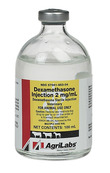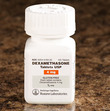Pronunciation
dex-a-METH-a-sone - Pronunciation guide
Brand Names
- Azium Powder
- Dexaject
- Dexamethasone Injection
- Dexamethasone Solution
- Dexasone
- Dexium® Injection
- Dexium® Tablets
Description
 Dexamethasone is a potent anti-inflammatory with therapeutic action used in horses with acute musculoskeletal inflammations. It also provides supportive therapy in a wide variety of cases, such as heat exhaustion, influenza, laminitis, and retained placenta, provided that the primary cause is diagnosed and corrected. It is not species specific and a veterinarian should be involved in all treatments using dexamethasone. It is considered to be a better anti-inflammatory than many steroids. .
Dexamethasone is a potent anti-inflammatory with therapeutic action used in horses with acute musculoskeletal inflammations. It also provides supportive therapy in a wide variety of cases, such as heat exhaustion, influenza, laminitis, and retained placenta, provided that the primary cause is diagnosed and corrected. It is not species specific and a veterinarian should be involved in all treatments using dexamethasone. It is considered to be a better anti-inflammatory than many steroids. .
Usage
Veterinarians prescribe dexamethasone for use in treating bursitis, carpitis, osselets, tendonitis, myositis, and sprains in horses. In addition, it is used in supportive therapy in cases of fatigue and heat exhaustion, influenza, laminitis, and retained placenta, along with diagnosis and treatment of the primary cause.
Dosage and Administration
 Dexamethasone Dexamethasone |
||||
|---|---|---|---|---|
| Method | Dosage (click row for calculator) |
Concentration | Period | Duration |
| Oral (powder) | 5-10 mg 1 | 10 mg/packet | Daily | NA |
| Intravenous or Intramuscular injection | 2.5-5 mg | 2 mg/ml | Daily | NA |
Notes:
|
||||
Side Effects
Side effects may include enzyme elevations, weight loss, anorexia, and laminitis. Some horses may show evidence of drowsiness or lethargy. Lethargy usually abates in approximately 24 hours.
Precautions
Animals receiving dexamethasone should be under close observation. Signs of infection may be masked. Therapy with dexamethasone, as with any other potent corticosteroid, should be individualized according to the severity of the condition, anticipated duration of steroid therapy, and the animal's tolerance for steroid excess.
Except for emergency therapy, dexamethasone should not be used in horses with nephritis or Cushing's Syndrome, congestive heart failure, or viral infections, unless usage is determined to be appropriate by a veterinarian.
Clinical and experimental data have demonstrated that corticosteroids administered orally or parenterally to mares may induce the first stage of parturition when administered during the last trimester of pregnancy.
Federal law restricts this drug to use by or on the order of a licensed veterinarian.
Use of dexamethasone would be prohibited in any drug-free competition. Check with the appropriate regulatory group.
Interactions
Dexamethasone should not be used with any other corticosteroids without a veterinarians oversight.
Overdose
Overdose may result in sodium retention, fluid retention, potassium loss, and weight gain. Drowsiness or lethargy may be more pronounced than noted in side effects.
Images
 Dexamethasone Injection
Dexamethasone Injection
 Dexamethasone Tablets
Dexamethasone Tablets
